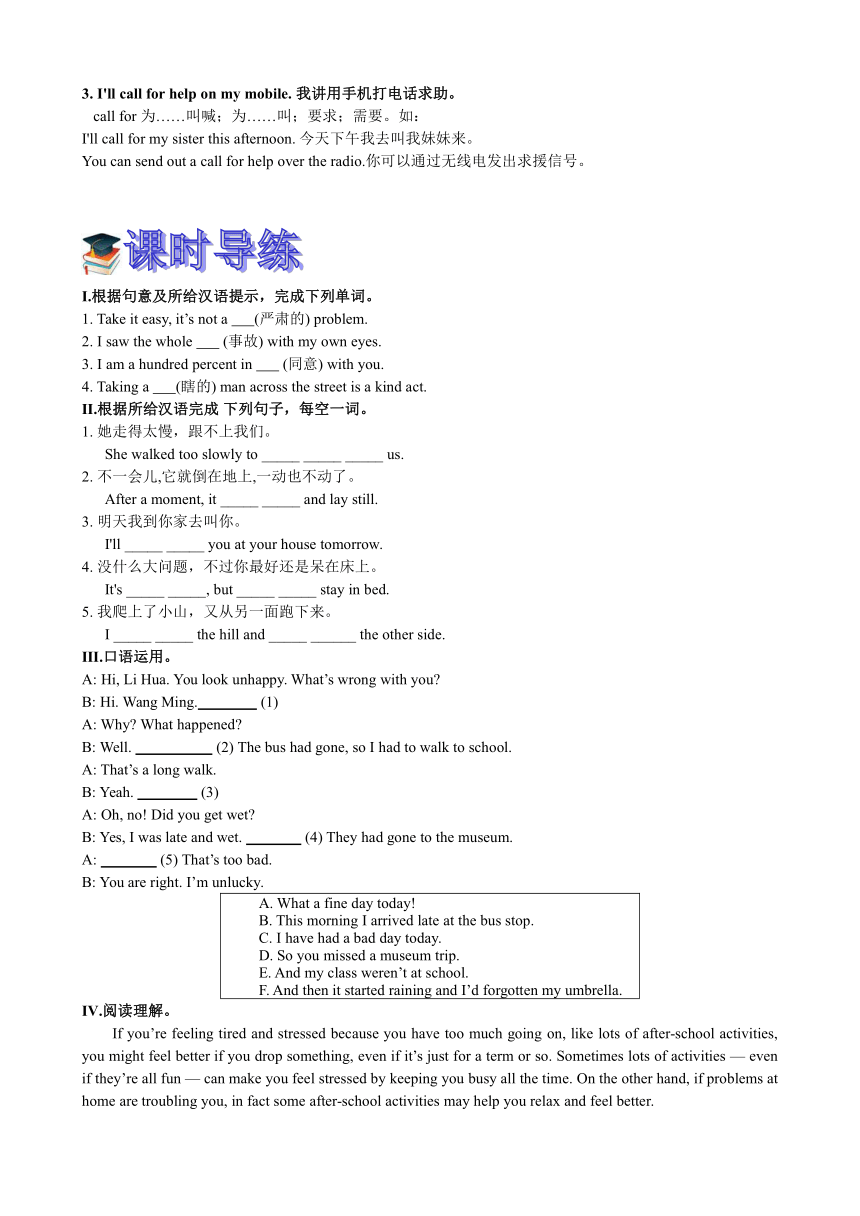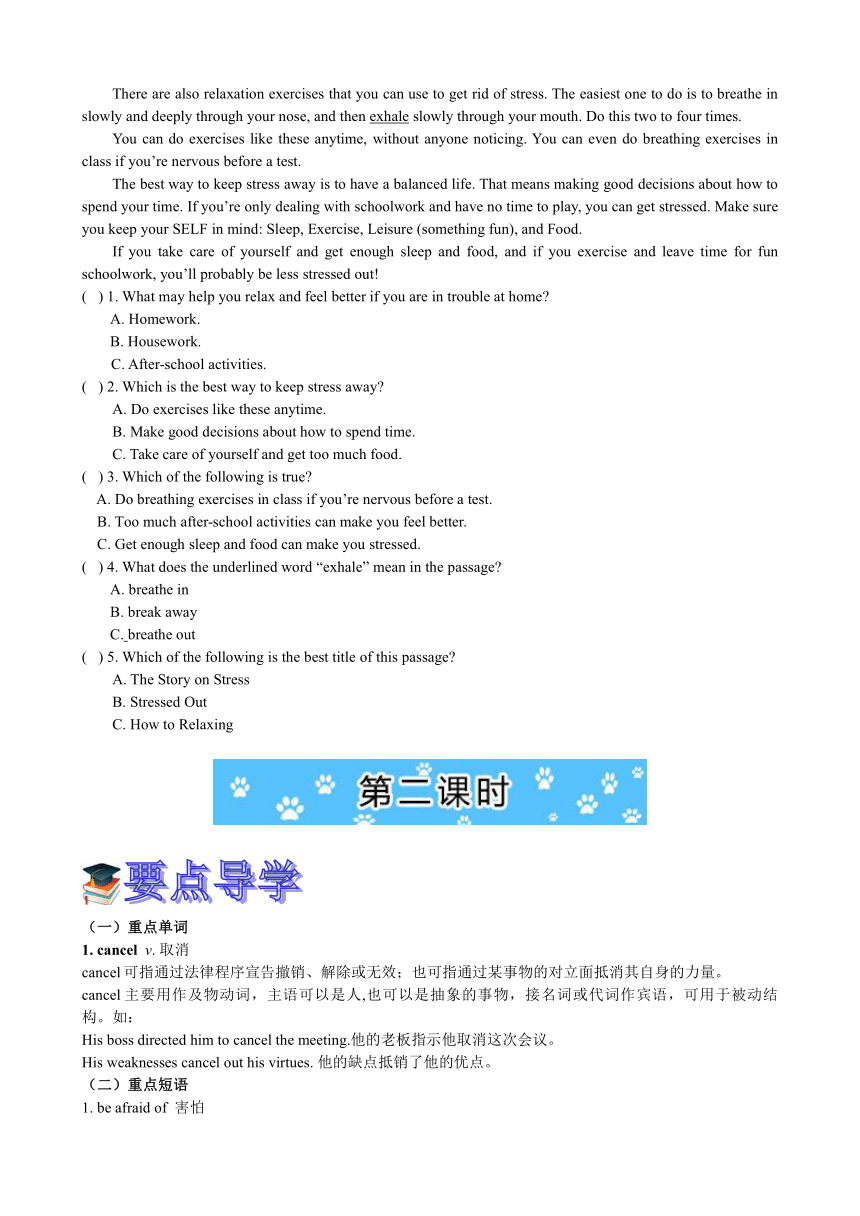外研版英语九年级下册 Module 5 Unit 1 We'd better get you to hospital.学案(无答案)
文档属性
| 名称 | 外研版英语九年级下册 Module 5 Unit 1 We'd better get you to hospital.学案(无答案) |

|
|
| 格式 | doc | ||
| 文件大小 | 134.0KB | ||
| 资源类型 | 教案 | ||
| 版本资源 | 外研版 | ||
| 科目 | 英语 | ||
| 更新时间 | 2023-02-15 00:00:00 | ||
图片预览




文档简介
Module 5 Look after yourself
Unit 1 We’d better get you to hospital.
(一)重点单词
1. agreement n. 意见一致;同意
agreement“协议”,指国家、政党、团体、个人之间双方或多方经过协商、谈判取得一致意见后所签订的合约,是可数名词。
agreement的另一个意思是“同意”,指一方同另一方的观点、看法或者与另一方的建议、条件、计划等意见相符,也指双方或多方就某事经协商后取得的一致意见或对某事看法一致,是不可数名词。如:
They have broken the agreement between us.他们撕毁了与我们的协议。
We are in agreement with their decision. 我们同意他们的决定。
(二)常考短语
1. had better 最好
2. wait for 等待
3. catch up 赶上
4. go back 回去
5. run down 撞倒;追捕
6. fall over 跌倒; 从…掉下来
(三)核心句型
1. We'd better get you to hospital. 你最好去医院。
(1)had better意为“最好”、“应该”,后接动词原形,与情态动词should用法相似,其中的had通常缩略为’d。如:
You’d better get some sleep. 你最好去睡一会儿。
We had better go before it rains. 我们最好在下雨前就去。
(2)had better构成否定式时,通常将not置于had better之后(而不是had之后);而构成疑问式时,则通常将had(而不是had better)置于主语之前。如:
I’d better not disturb him. 我最好别去打扰他。
What had we better do 我们最好怎么办
【注意】在否定疑问句或反意疑问句中可将not与had连用。例如:
Hadn’t we better go now 我们是不是现在就去呢
2. He was running down the steps when he fell over. 他跑下台阶时,他摔倒在地。
(1)run down 撞倒;贬低;追捕;查出;(使)筋疲力竭。如:
The boy hops the ditch and run down the path.那男孩跳过沟,沿著小路奔去。
If you drive so fast, you'll run down someone some day.你要是开得这么快,总有一天会撞伤人的。
(2)fall over 跌倒; 从…掉下来;落在…上;叛变,颠覆。如:
The old grandma suddenly fell over.
那位老太太突然摔倒了。
Be careful not to fall over the railing.
小心别跌在栏杆上。
3. I'll call for help on my mobile. 我讲用手机打电话求助。
call for 为……叫喊;为……叫;要求;需要。如:
I'll call for my sister this afternoon. 今天下午我去叫我妹妹来。
You can send out a call for help over the radio.你可以通过无线电发出求援信号。
Ⅰ.根据句意及所给汉语提示,完成下列单词。
1. Take it easy, it’s not a (严肃的) problem.
2. I saw the whole (事故) with my own eyes.
3. I am a hundred percent in (同意) with you.
4. Taking a (瞎的) man across the street is a kind act.
Ⅱ.根据所给汉语完成 下列句子,每空一词。
1. 她走得太慢,跟不上我们。
She walked too slowly to _____ _____ _____ us.
2. 不一会儿,它就倒在地上,一动也不动了。
After a moment, it _____ _____ and lay still.
3. 明天我到你家去叫你。
I'll _____ _____ you at your house tomorrow.
4. 没什么大问题,不过你最好还是呆在床上。
It's _____ _____, but _____ _____ stay in bed.
5. 我爬上了小山,又从另一面跑下来。
I _____ _____ the hill and _____ ______ the other side.
Ⅲ.口语运用。
A: Hi, Li Hua. You look unhappy. What’s wrong with you
B: Hi. Wang Ming. (1)
A: Why What happened
B: Well. (2) The bus had gone, so I had to walk to school.
A: That’s a long walk.
B: Yeah. (3)
A: Oh, no! Did you get wet
B: Yes, I was late and wet. (4) They had gone to the museum.
A: (5) That’s too bad.
B: You are right. I’m unlucky.
A. What a fine day today!B. This morning I arrived late at the bus stop.C. I have had a bad day today.D. So you missed a museum trip.E. And my class weren’t at school.F. And then it started raining and I’d forgotten my umbrella.
Ⅳ.阅读理解。
If you’re feeling tired and stressed because you have too much going on, like lots of after-school activities, you might feel better if you drop something, even if it’s just for a term or so. Sometimes lots of activities — even if they’re all fun — can make you feel stressed by keeping you busy all the time. On the other hand, if problems at home are troubling you, in fact some after-school activities may help you relax and feel better.
There are also relaxation exercises that you can use to get rid of stress. The easiest one to do is to breathe in slowly and deeply through your nose, and then exhale slowly through your mouth. Do this two to four times.
You can do exercises like these anytime, without anyone noticing. You can even do breathing exercises in class if you’re nervous before a test.
The best way to keep stress away is to have a balanced life. That means making good decisions about how to spend your time. If you’re only dealing with schoolwork and have no time to play, you can get stressed. Make sure you keep your SELF in mind: Sleep, Exercise, Leisure (something fun), and Food.
If you take care of yourself and get enough sleep and food, and if you exercise and leave time for fun schoolwork, you’ll probably be less stressed out!
( ) 1. What may help you relax and feel better if you are in trouble at home
A. Homework.
B. Housework.
C. After-school activities.
( ) 2. Which is the best way to keep stress away
A. Do exercises like these anytime.
B. Make good decisions about how to spend time.
C. Take care of yourself and get too much food.
( ) 3. Which of the following is true
A. Do breathing exercises in class if you’re nervous before a test.
B. Too much after-school activities can make you feel better.
C. Get enough sleep and food can make you stressed.
( ) 4. What does the underlined word “exhale” mean in the passage
A. breathe in
B. break away
C. breathe out
( ) 5. Which of the following is the best title of this passage
A. The Story on Stress
B. Stressed Out
C. How to Relaxing
(一)重点单词
1. cancel v. 取消
cancel可指通过法律程序宣告撤销、解除或无效;也可指通过某事物的对立面抵消其自身的力量。
cancel主要用作及物动词,主语可以是人,也可以是抽象的事物,接名词或代词作宾语,可用于被动结构。如:
His boss directed him to cancel the meeting.他的老板指示他取消这次会议。
His weaknesses cancel out his virtues. 他的缺点抵销了他的优点。
(二)重点短语
1. be afraid of 害怕
2. go back home 回家
3. on one’s way to 在去…的路上
4. in front of 在…前面
5. fall off 跌落;下降
(三)重点句型
1. What happened to Daming 大明发生了什么事?
happen是不及物动词,作“发生”解时,可指偶然的事故,也可指有计划或无计划发生的事。一般以事件、环境、形势等作主语,表示“某人发生某事”时,须以介词to 引出“某人”。作“碰巧”解时,其后须接动词不定式构成复合谓语,可由人称代词或无人称代词it作主语。
If you should happen to see him, please give him my regards.
如果你万一见到他,请代我向他致意。
I have no idea what happen to him later. 我不知道他后来发生了什么事。
Ⅰ.从方框中选择适当的短语,并用其正确形式填空。
what happen, get a fever, wait a minute, in a few minute, of course, catch up, nothing serious, call for help, fall over, feel a bit cold
1. If you are in danger, just help.
2. you can bring your date to my party.
3. I have no idea to him yesterday.
4. I was unlucky to step on a banana skin and .
5. You go ahead and we’ll follow .
6. ! Let me finish what I have to say.
7. Although it was already December, I didn’t .
8. Your forehead is burning. Have you
9. He fell off the bike but happened.
10. They started a few minutes ago, and we must hurry to .
Ⅱ.短文填空。
Wang Yaping is a Chinese spacewoman. She has made history when she was thirty-three years old—she has been China’s f 1 teacher in space.
Wang taught Chinese primary and middle school students on Earth physics phenomena(现象)in space. She prepared w 2 for the lecture and expressed full confidence about the lesson.
Meeting the media, she said, “We are all s 3 facing the space. We are l 4 forward to encouraging our young friends to learn and research the mystical and beautiful space. ”
Wang was born in January 1980. She is f 5 east China’s Shandong Province. She was a pilot in the People’s Liberation Army Air Force with experience of 1,600 h 6 of flying.
Except the space lecture, Wang w 7 responsible(负责的) for monitoring (监测) the conditions of spacecraft, space experiments and operation of equipment, among others.
Wang has served the People’s Liberation Army s 8 August 1997. In May 2010, Wang became a member of the second batch of Chinese astronauts. Wang was chosen to be the member of the Shenzhou-10 space group in April 2013. She was China’s second woman astronaut who was sent into space after Liu Yang who flew with
the Shenzhou-9 spacecraft.
How great Wang Yaping is!
1. 2. 3. 4.
5. 6. 7. 8.
Unit 1 We’d better get you to hospital.
(一)重点单词
1. agreement n. 意见一致;同意
agreement“协议”,指国家、政党、团体、个人之间双方或多方经过协商、谈判取得一致意见后所签订的合约,是可数名词。
agreement的另一个意思是“同意”,指一方同另一方的观点、看法或者与另一方的建议、条件、计划等意见相符,也指双方或多方就某事经协商后取得的一致意见或对某事看法一致,是不可数名词。如:
They have broken the agreement between us.他们撕毁了与我们的协议。
We are in agreement with their decision. 我们同意他们的决定。
(二)常考短语
1. had better 最好
2. wait for 等待
3. catch up 赶上
4. go back 回去
5. run down 撞倒;追捕
6. fall over 跌倒; 从…掉下来
(三)核心句型
1. We'd better get you to hospital. 你最好去医院。
(1)had better意为“最好”、“应该”,后接动词原形,与情态动词should用法相似,其中的had通常缩略为’d。如:
You’d better get some sleep. 你最好去睡一会儿。
We had better go before it rains. 我们最好在下雨前就去。
(2)had better构成否定式时,通常将not置于had better之后(而不是had之后);而构成疑问式时,则通常将had(而不是had better)置于主语之前。如:
I’d better not disturb him. 我最好别去打扰他。
What had we better do 我们最好怎么办
【注意】在否定疑问句或反意疑问句中可将not与had连用。例如:
Hadn’t we better go now 我们是不是现在就去呢
2. He was running down the steps when he fell over. 他跑下台阶时,他摔倒在地。
(1)run down 撞倒;贬低;追捕;查出;(使)筋疲力竭。如:
The boy hops the ditch and run down the path.那男孩跳过沟,沿著小路奔去。
If you drive so fast, you'll run down someone some day.你要是开得这么快,总有一天会撞伤人的。
(2)fall over 跌倒; 从…掉下来;落在…上;叛变,颠覆。如:
The old grandma suddenly fell over.
那位老太太突然摔倒了。
Be careful not to fall over the railing.
小心别跌在栏杆上。
3. I'll call for help on my mobile. 我讲用手机打电话求助。
call for 为……叫喊;为……叫;要求;需要。如:
I'll call for my sister this afternoon. 今天下午我去叫我妹妹来。
You can send out a call for help over the radio.你可以通过无线电发出求援信号。
Ⅰ.根据句意及所给汉语提示,完成下列单词。
1. Take it easy, it’s not a (严肃的) problem.
2. I saw the whole (事故) with my own eyes.
3. I am a hundred percent in (同意) with you.
4. Taking a (瞎的) man across the street is a kind act.
Ⅱ.根据所给汉语完成 下列句子,每空一词。
1. 她走得太慢,跟不上我们。
She walked too slowly to _____ _____ _____ us.
2. 不一会儿,它就倒在地上,一动也不动了。
After a moment, it _____ _____ and lay still.
3. 明天我到你家去叫你。
I'll _____ _____ you at your house tomorrow.
4. 没什么大问题,不过你最好还是呆在床上。
It's _____ _____, but _____ _____ stay in bed.
5. 我爬上了小山,又从另一面跑下来。
I _____ _____ the hill and _____ ______ the other side.
Ⅲ.口语运用。
A: Hi, Li Hua. You look unhappy. What’s wrong with you
B: Hi. Wang Ming. (1)
A: Why What happened
B: Well. (2) The bus had gone, so I had to walk to school.
A: That’s a long walk.
B: Yeah. (3)
A: Oh, no! Did you get wet
B: Yes, I was late and wet. (4) They had gone to the museum.
A: (5) That’s too bad.
B: You are right. I’m unlucky.
A. What a fine day today!B. This morning I arrived late at the bus stop.C. I have had a bad day today.D. So you missed a museum trip.E. And my class weren’t at school.F. And then it started raining and I’d forgotten my umbrella.
Ⅳ.阅读理解。
If you’re feeling tired and stressed because you have too much going on, like lots of after-school activities, you might feel better if you drop something, even if it’s just for a term or so. Sometimes lots of activities — even if they’re all fun — can make you feel stressed by keeping you busy all the time. On the other hand, if problems at home are troubling you, in fact some after-school activities may help you relax and feel better.
There are also relaxation exercises that you can use to get rid of stress. The easiest one to do is to breathe in slowly and deeply through your nose, and then exhale slowly through your mouth. Do this two to four times.
You can do exercises like these anytime, without anyone noticing. You can even do breathing exercises in class if you’re nervous before a test.
The best way to keep stress away is to have a balanced life. That means making good decisions about how to spend your time. If you’re only dealing with schoolwork and have no time to play, you can get stressed. Make sure you keep your SELF in mind: Sleep, Exercise, Leisure (something fun), and Food.
If you take care of yourself and get enough sleep and food, and if you exercise and leave time for fun schoolwork, you’ll probably be less stressed out!
( ) 1. What may help you relax and feel better if you are in trouble at home
A. Homework.
B. Housework.
C. After-school activities.
( ) 2. Which is the best way to keep stress away
A. Do exercises like these anytime.
B. Make good decisions about how to spend time.
C. Take care of yourself and get too much food.
( ) 3. Which of the following is true
A. Do breathing exercises in class if you’re nervous before a test.
B. Too much after-school activities can make you feel better.
C. Get enough sleep and food can make you stressed.
( ) 4. What does the underlined word “exhale” mean in the passage
A. breathe in
B. break away
C. breathe out
( ) 5. Which of the following is the best title of this passage
A. The Story on Stress
B. Stressed Out
C. How to Relaxing
(一)重点单词
1. cancel v. 取消
cancel可指通过法律程序宣告撤销、解除或无效;也可指通过某事物的对立面抵消其自身的力量。
cancel主要用作及物动词,主语可以是人,也可以是抽象的事物,接名词或代词作宾语,可用于被动结构。如:
His boss directed him to cancel the meeting.他的老板指示他取消这次会议。
His weaknesses cancel out his virtues. 他的缺点抵销了他的优点。
(二)重点短语
1. be afraid of 害怕
2. go back home 回家
3. on one’s way to 在去…的路上
4. in front of 在…前面
5. fall off 跌落;下降
(三)重点句型
1. What happened to Daming 大明发生了什么事?
happen是不及物动词,作“发生”解时,可指偶然的事故,也可指有计划或无计划发生的事。一般以事件、环境、形势等作主语,表示“某人发生某事”时,须以介词to 引出“某人”。作“碰巧”解时,其后须接动词不定式构成复合谓语,可由人称代词或无人称代词it作主语。
If you should happen to see him, please give him my regards.
如果你万一见到他,请代我向他致意。
I have no idea what happen to him later. 我不知道他后来发生了什么事。
Ⅰ.从方框中选择适当的短语,并用其正确形式填空。
what happen, get a fever, wait a minute, in a few minute, of course, catch up, nothing serious, call for help, fall over, feel a bit cold
1. If you are in danger, just help.
2. you can bring your date to my party.
3. I have no idea to him yesterday.
4. I was unlucky to step on a banana skin and .
5. You go ahead and we’ll follow .
6. ! Let me finish what I have to say.
7. Although it was already December, I didn’t .
8. Your forehead is burning. Have you
9. He fell off the bike but happened.
10. They started a few minutes ago, and we must hurry to .
Ⅱ.短文填空。
Wang Yaping is a Chinese spacewoman. She has made history when she was thirty-three years old—she has been China’s f 1 teacher in space.
Wang taught Chinese primary and middle school students on Earth physics phenomena(现象)in space. She prepared w 2 for the lecture and expressed full confidence about the lesson.
Meeting the media, she said, “We are all s 3 facing the space. We are l 4 forward to encouraging our young friends to learn and research the mystical and beautiful space. ”
Wang was born in January 1980. She is f 5 east China’s Shandong Province. She was a pilot in the People’s Liberation Army Air Force with experience of 1,600 h 6 of flying.
Except the space lecture, Wang w 7 responsible(负责的) for monitoring (监测) the conditions of spacecraft, space experiments and operation of equipment, among others.
Wang has served the People’s Liberation Army s 8 August 1997. In May 2010, Wang became a member of the second batch of Chinese astronauts. Wang was chosen to be the member of the Shenzhou-10 space group in April 2013. She was China’s second woman astronaut who was sent into space after Liu Yang who flew with
the Shenzhou-9 spacecraft.
How great Wang Yaping is!
1. 2. 3. 4.
5. 6. 7. 8.
同课章节目录
- Module 1 Travel
- Unit 1 We toured the city by bus and by taxi
- Unit 2 It's a long story.
- Unit 3 Language in use
- Module 2 Education
- Unit 1 They don't sit in rows.
- Unit 2 What do I like best about school?
- Unit 3 Language in use
- Module 3 Life now and then
- Unit 1 They sometimes work harder.
- Unit 2 I think life is better today.
- Unit 3 Language in use.
- Module 4 Rules and suggestions
- Unit 1 You must be careful of falling stones.
- Unit 2 we must keep the camp clean.
- Unit 3 Language in use.
- Revison A
- Module 5 Look after yourself
- Unit 1 We'd better get you to hospital.
- Unit 2 Get off the sofa!
- Unit 3 Language in use.
- Module 6 Eating togethe
- Unit 1 When is the school-leavers' party?
- Unit 2 Knives and forks are used for most Western
- Unit 3 Language in use
- Module 7 English for you and me
- Unit 1 Have you ever been to an English corner?
- Unit 2 We all own English.
- Unit 3 Language in use
- Module 8 My future life
- Unit 1 Here's to our friendship and the future
- Unit 2 I know that you will be better at maths.
- Unit 3 Language in use
- Revison B
